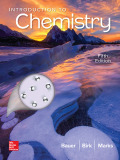
Interpretation:
The orbital diagrams for the ground-state electron arrangement for silicon, lithium, and phosphorus on the basis of the Aufbau’s principle, Pauli’s exclusion principle, and Hund’s rule are to be completed.
Concept Introduction:
Orbital diagrams are the descriptions of the electrons in an atom in a pictorial form by following the Aufbau’s principle, Pauli’s exclusion principle, and Hund’s rule.
Aufbau principle states that in the ground state of an atom the electrons are filled in the orbital in the increasing order of orbital energy level, which means the lowest energy level is filled before those of higher energy levels.
Pauli’s exclusion principle states that two electrons that represent in an atom or molecule never have the same four electronic quantum numbers. An orbital that carries a maximum of two electrons should have opposite spin which means that one electron must be up-spin and another must have a down spin.
Hund’s rule states that before the double occupation of any orbital, every orbital in the sub-level is singly occupied and the electron present in the singly occupied orbitals possess identical spin.
Want to see the full answer?
Check out a sample textbook solution
Chapter 7 Solutions
EBK INTRODUCTION TO CHEMISTRY
- Sketch an orbital contour that is expected for an electron that has n = 3 and = 2.arrow_forwardAnswer the following questions, assuming that ms, could have three values rather than two and that the rules for n, l, and ml are the normal ones. a. How many electrons would an orbital be able to hold? b. How many elements would the first and second periods in the periodic table contain? c. How many elements would be contained in the first transition metal series? d. How many electrons would the set of 4f orbitals be able to bold?arrow_forwardConsider the eight most abundant elements in the human body, as outlined in Exercise 156. Excluding hydrogen, which of these elements would have the smallest size? largest size? smallest first ionization energy? largest first ionization energy?arrow_forward
 Chemistry: The Molecular ScienceChemistryISBN:9781285199047Author:John W. Moore, Conrad L. StanitskiPublisher:Cengage Learning
Chemistry: The Molecular ScienceChemistryISBN:9781285199047Author:John W. Moore, Conrad L. StanitskiPublisher:Cengage Learning ChemistryChemistryISBN:9781305957404Author:Steven S. Zumdahl, Susan A. Zumdahl, Donald J. DeCostePublisher:Cengage Learning
ChemistryChemistryISBN:9781305957404Author:Steven S. Zumdahl, Susan A. Zumdahl, Donald J. DeCostePublisher:Cengage Learning
 Chemistry: An Atoms First ApproachChemistryISBN:9781305079243Author:Steven S. Zumdahl, Susan A. ZumdahlPublisher:Cengage Learning
Chemistry: An Atoms First ApproachChemistryISBN:9781305079243Author:Steven S. Zumdahl, Susan A. ZumdahlPublisher:Cengage Learning Chemistry: Principles and PracticeChemistryISBN:9780534420123Author:Daniel L. Reger, Scott R. Goode, David W. Ball, Edward MercerPublisher:Cengage Learning
Chemistry: Principles and PracticeChemistryISBN:9780534420123Author:Daniel L. Reger, Scott R. Goode, David W. Ball, Edward MercerPublisher:Cengage Learning Introductory Chemistry: An Active Learning Approa...ChemistryISBN:9781305079250Author:Mark S. Cracolice, Ed PetersPublisher:Cengage Learning
Introductory Chemistry: An Active Learning Approa...ChemistryISBN:9781305079250Author:Mark S. Cracolice, Ed PetersPublisher:Cengage Learning





